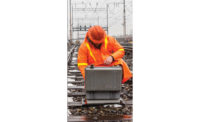Freight and commuter railroads across the U.S. achieved enough milestones by a Dec. 31, 2018, federal deadline for installing automatic train control systems to avoid potential federal penalties.
But only four of the 41 carriers covered by the statutory mandate had the required locomotive and wayside Positive Train Control (PTC) equipment fully deployed and also fulfilled other requirements.
They are the New York-New Jersey Port Authority Trans-Hudson, California’s North County Transit District, Oregon’s Portland & Western Railroad, and the Southern California Regional Rail Authority’s Metrolink.
The other 37 railroads made sufficient progress to gain a two-year extension to meet all requirements while work continues, the Federal Railroad Administration (FRA) said in a year-end statement.
PTC systems seek to prevent trains from collisions and excessive speeding. The National Transportation Safety Board has long identified the lack of such systems as a significant safety problem.
Based upon railroads’ self-reporting, FRA says PTC had been installed on 94% of freight railroad track segments, and 77% of passenger systems as of Sept. 30. In addition, 12 railroads obtained conditional PTC System Certification from FRA, which allows them to operate PTC in revenue service on the general rail network.
Qualifying for an extension beyond 2018 was no easy task for some railroads. For example, NJ Transit began 2018 with only 12% of its fleet equipped with PTC technology. When new executive director Kevin Corbett took office last February, he changed the agency’s approach, including creating a “war room” to foster more collaboration among staff and consultants.
NJ Transit says that by mid-December it completed about four years of PTC work in 10 months. It met an FRA benchmark of having 282 of its 440 locomotives and cab cars ready for PTC revenue service operation and having wayside equipment installed along 326 miles of track.
NJ Transit is among the publicly owned railroads that relied on federal aid to cover PTC implementation costs. Since 2017, FRA has provided more than $510 million for PTC projects, including 11 grants totaling more than $46 million awarded in mid-December.
In that batch of grants, NJ Transit will receive up to $6.5 million to add PTC on 33 multilevel cab cars. Other recipients include Amtrak, which received $9.1 million to deploy PTC wayside technology on 179 miles of predominantly single track between Dodge City, Kan., and Las Animas, Colo. The Massachusetts Bay Transportation Authority will get up to $7.5 million to upgrade and commission its safety network on three rail lines.
Freight railroads mainly use their own funds on a PTC implementation process expected to total more than $11 billion, according to the Association of American Railroads. The association reported in early January that 80% of the route-miles that Class I carriers own and operate are now equipped with PTC.
AAR notes that ensuring PTC interoperability between individual railroads and their tenant lines will remain a major challenge to completing the implementation process.




